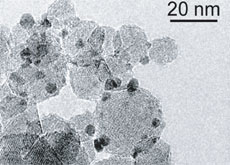Swiss nanoparticle startup explores a global opportunity

Two-month-old FlamePowders AG, is in an enviable position for a university spin-off company.
It has customers lining up to buy its powders for use in the chemical, electronics and automotive industries.
It was the cold calls from industry to his lab at the Swiss Federal Institute of Technology (ETH) to order the engineered powders made using a process called flame synthesis that convinced Karsten Wegner to leave the halls of academia to pursue a career as an entrepreneur.
With private seed funding and ETH support, he and co-founder, the ETH assistant professor Wendelin Stark, registered the company in February, after filing patents. It is now established in Schlieren, west of Zurich.
The company aims to sell its nanoparticle based powders to a number of clearly defined markets, some of the first being makers of catalysts and fuel cells, as well as manufacturers of “slurries” used to polish semiconductor wafers and optical components. These markets already exist and should grow say analysts.
Develop sales
Having a clear target market is an important factor for success, according to Axel Ebenau of BASF Future Business GmbH in Ludwigshafen, Germany.
Although he had not heard of FlamePowders, he said that in general startups can grow in the global specialty chemicals industry if they aim to penetrate a clearly defined market or application.
“There are a lot of start-up companies and researchers making nanoparticles. So it is critical to have a clearly defined application with in the market,” said Ebenau.
He added that the makers of slurries and fuel cell catalysts are few and well known, so it is feasible that company of FlamePowders’ size could develop sales opportunities.
The tiny Swiss firm’s competitors are all publicly traded companies, so it will have to be smart in its approach to the market.
Competition
In the United States, Nanophase Corp, based in Romeoville, Illinois, which had a turnover some $5.5 million (SFr7 million) last year, is one of its competitors. The US firm recently signed a global and exclusive agreement with Altana Chemie AG, to supply certain nanomaterials for use in paints, coatings, and plastics.
Cabot Corporation of Boston acquired another competitor, Superior Micro Materials of Albuquerque, New Mexico, for $16 million in June 2003. It is working on scaling up its process and has plans to target a number of applications.
Germany’s Degussa AG is also developing a subsidiary, called AdNano that will market nanopowders.
What gives FlamePowders the confidence to compete against such firms is its patented processes that are cheaper, cleaner, and faster than existing methods.
For example, the way the Swiss company prepares the materials prior to the industry standard flame synthesizing process, called a precursor, is unique.
In addition the technology it developed to apply the precursor to the flame is unique. Wegner says the simplicity in design of his firm’s process also means that FlamePowders’ products cost one-third the price of their closest competitor.
Increased production
“A differentiator, whether it is price, or another benefit, making it superior to the existing solutions will also contribute to the growth of a new player starting in the market,” commented Ebenau.
Another advantage it has is the temperature of its process, which reaches up to 3000 degrees Celsius, resulting in powders that are more pure than competing technologies.
Today, FlamePowders has a production capacity today of one kilo per hour and reactor and it is a “proven, scalable process”, according to Wegner.
Increased production is planned as soon as capital is in place to acquire and install more equipment, which is based on standard machinery. Wegner hopes to continue research and development as well as building a production facility.
He believes the process can be applied to “any material from the periodic table”. Most existing processes are limited to four or five compounds, he added.
by Valerie Thompson

In compliance with the JTI standards
More: SWI swissinfo.ch certified by the Journalism Trust Initiative
You can find an overview of ongoing debates with our journalists here. Please join us!
If you want to start a conversation about a topic raised in this article or want to report factual errors, email us at english@swissinfo.ch.